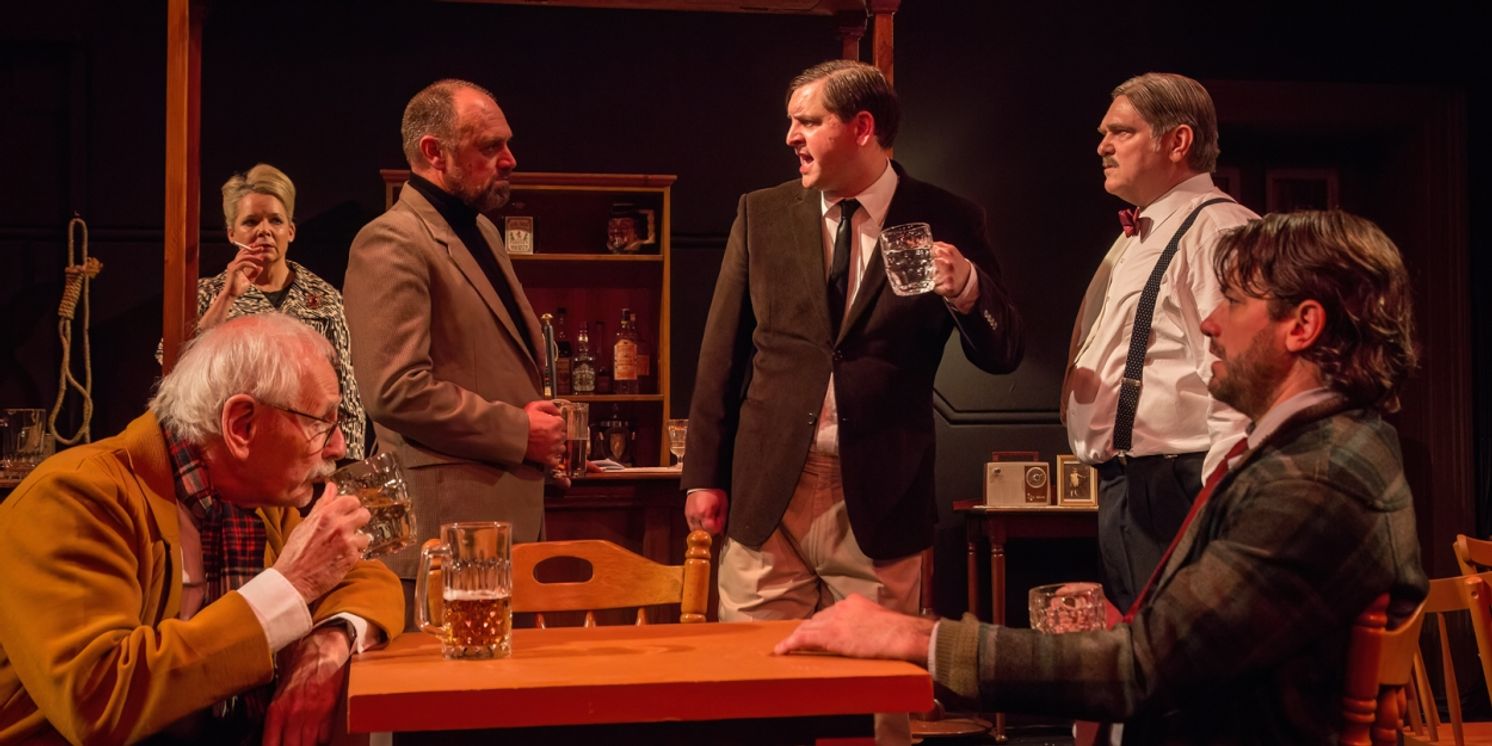Review: HANGMEN at The Studio, Holden Street Theatres
Meet England's second best hangman.

Reviewed by Barry Lenny, Thursday 24th October 2024.
Red Phoenix stages productions that have never been seen before in South Australia but, more than that, the works that they present are each carefully selected from many that the committee reads every year, and they are presented with such high quality that, in the few short years that it has been running, the company has won a string of awards, including numerous prestigious awards from the Adelaide Critics Circle, both group awards for productions, and individual awards won by members of the casts. The company has a very strong following and regularly sells out performances. Opening night was sold out and only about 200 tickets are left for the remainder of the entire season.
Martin McDonagh, in his 2015 black comedy, Hangmen, takes us back to 1965, to the pub in Oldham, Greater Manchester, run by Harry Wade and his wife Alice, where three regulars, Bill, Charlie, and Arthur, who is hard of hearing, a police officer, Inspector Fry, and a local journalist, Derek Clegg, have gathered to learn of England’s second-best hangman’s reaction to the news of the abolition of hanging, and the end of his career.
First, though, we see him and his assistant, Syd Armfield, at their work, preparing to hang a man named Hennessey, as they are watched by two guards, a doctor, and the prison governor. Right up to the end, Hennessey claims that he is innocent. Trevor Anderson makes the most of his brief but important appearance as Hennessey.
The group make fun of the young journalist, mocking him for his age. While the group are quizzing Harry about his future, he avoids making a statement, until the journalist mentions that Albert Pierrepoint, the best of England’s hangmen, will be talking to the press. Harry takes him away from the bar for a private conversation, resulting, much later, in the publication of an article, with a photograph, in the newspaper.
A stranger with a London accent, Peter Mooney, arrives seeking to rent a room. He becomes progressively more sinister, more menacing as the play progresses, and appears to take an interest in Harry’s fifteen-year-old daughter, Shirley, who later goes missing.
Among other events, England’s best hangman, Yorkshireman, Albert Pierrepoint (a real person, 30 March 1905 to 10 July 1992, he was an English hangman who executed between 435 and 600 people in a 25-year career that ended in 1956), turns up, confronting Harry over disparaging comments that he made in the newspaper. Pierrepoint actually retired a decade before Parliament ended hanging.
This play is decidedly Pinteresque, dark, with convoluted dialogue, mysterious characters, twisted plotlines leading to unexpected revelations, and an ending that leaves one wondering what might have happened later.
Director, Nick Fagan, has brought together an impressive group of experienced actors, with Brant Eustice playing the central role of Harry Wade. Fagan builds the tension and the conflicts, but doesn’t overlook the comedy. There are plenty of laughs, even if they are often awkward due to the content of McDonagh’s writing.
Eustice turns in another of his well-considered performances as Harry, ranging from a cheerful centre of attention, holding court from behind the bar to his sycophantic clientele, to the heights of fury and frustration. He commands the stage at all times.
This is not a one-horse race, though, as the rest of the cast also give sterling performances. Rachel Dalton plays Harry’s wife, Alice, a gin-swilling chain-smoker, and her no-nonsense characterisation well balances that of Eustice, creating some strong exchanges between them.
Finty McBain plays his daughter, Shirley, who mopes about, bored and miserable, until Mooney pays her some attention. McBain is ideally morose, speaking begrudgingly to her parents and the others in the pub. She handles the gradual transition when spoken to by Mooney with skill.
Steve Marvanek, as the dim-witted Bill, Leighton Vogt as Arthur’s interpreter, Charlie, and Greg Janzow, as the rather deaf, Arthur, add humour as the three regulars who give the impression that they are in situ from opening to closing time every day. Russell Slater completes the group of regulars as Inspector Sly, who prefers the pub to the police station, apparently permanently ‘off watch’. It is fortunate that non-alcoholic beer is now readily available or the cast would have trouble remembering their own names by the end of the night, let alone their lines, downing pint after pint throughout the performance.
Josh Coldwell is, well, very creepy, as Mooney, the character insisting that he is menacing, and not creepy at all. He is probably the most Pinteresque of all of the characters and Coldwell is ideally cast.
Jack Robins plays Syd, neatly conveying that his character is carrying a very large chip on his shoulder for constantly being criticised by Harry, and hoping to bring him down a peg or two. Gary George explodes onto the stage as the angry Pierrepoint, using every bit of the space and overpowering everybody. Tom Tassone, as Clegg, shows that his character is not bothered by the group’s attempts at ridicule and has the perseverance to get the interview that he wanted, playing on Harry’s dislike of Pierrepoint.
Fagan’s set design is more elaborate than the usual Red Phoenix style, with a very solid-looking bar upstage-centre and tables and chairs in the foreground. That bar would look good in anybody’s ‘man cave’. As usual, Richard Parkhill is responsible for the effective lighting design, and the sound design is by Sean Smith and Fagan. Costumes, hairstyles, and props all fit the era nicely.
There are some, admittedly, inconsistencies in the accents but, to be fair, the Lancashire dialect is not easy to replicate. With only a small number of tickets left, it would be wise to move swiftly to book yours. You don’t want to miss this one.
Photography, Richard Parkhill,
Reader Reviews

Videos

